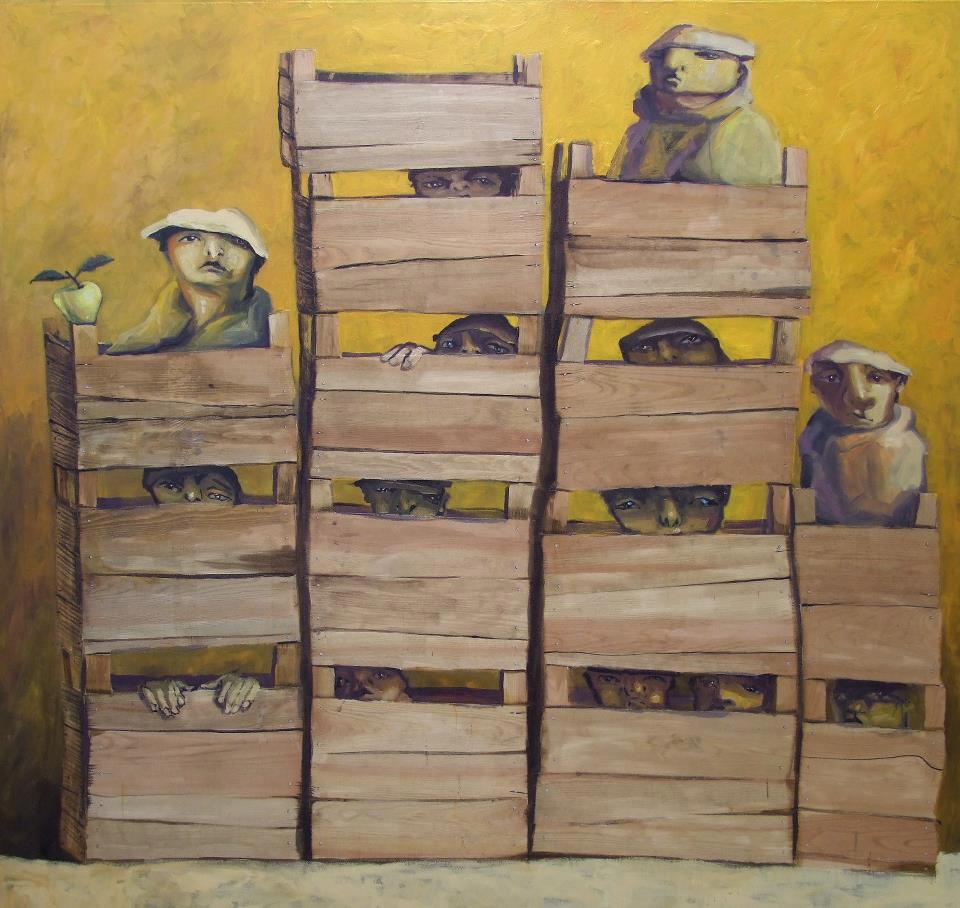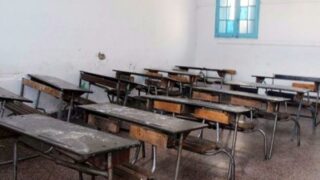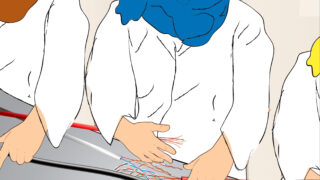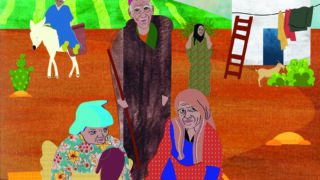
This publication has benefited from the support of the Rosa Luxemburg Foundation. This text may be reproduced in part or in full, provided the source is acknowledged.
Parallel Economy, shadow economy, grey economy and informal economy are different names for one notion that can be defined as ‘undeclared incomes and unauthorized economic activities which remain non subject to taxation and formal procedures’.
When parallel economy is considered, the first thing that usually comes to mind is smuggling, even though this kind of activity is only a small part of a much broader multifaceted phenomenon. Many forget or intentionally "ignore" the tax evasions practiced by companies and shops, the landlords who leases without official contracts, and many similar practices. It also seems that many do not realize that having undocumented workers with no social or health coverage is a part of how parallel economy works. Hundreds of thousands of Tunisians work in fields, construction sites, small factories, restaurants and cafes without any documentation by their employers. Criminal or “unethical” activities such as drug trafficking, sex trafficking, human trade networks, smuggling of antiquities, theft gangs, etc. being, of course, a whole different issue.
It is definitively impossible to provide accurate numbers; however, all estimations agree that the size and forms of parallel economy are ever-growing in Tunisia where, in some regions, the word “parallel” has lost its meaning as formal economy, itself, became “parallel”!
Estimations and Indicators
Parallel economy contributes 38 percent to the gross domestic product (GDP) (official figures of 2015), according to the International Labor Organization (ILO, 2015). It provides employment to about 75 percent of young people aged between 15 and 29.
The figures declared by the Ministry of Finance in 2016 indicate that employees contribute 83 percent to the tax revenues, while their share of wealth does not exceed 26 percent, meaning that those who dominate wealth only pay a miniscule part of the fiscal bill.
There are 28 thousand offshore companies in Tunisia, thousands of which do not have any employee, one of the reasons why the European Union has placed Tunisia on the blacklist of ‘tax havens’.
Estimates are issued either by the government or by local or international organizations. Although these numbers differ, they show that parallel economy contributes at least 38 percent to the GDP (official figures of 2015). According to a study published in 2015 by the International Labor Organization (ILO), the parallel economy employs about 75 percent of young people aged between 15 and 29, making up to 54 percent of the total workforce in the private sector, based on figures by the World Bank (2013).
Of course, these generalizing statistics can be "deceptive". They may be significantly lower in some of the richer areas while they are certainly much higher in regions of the southern and western borders of Tunisia. A study on the phenomenon of parallel trade and smuggling on the Tunisian-Libyan border, conducted by the ‘Tunisian Institute for Strategic Studies’ in November 2017, reveals that 77.6 percent of Tunisians buy contraband goods, and that 76 percent of the goods imported from Libya pass through smuggling channels.
‘Josour Center for Public Policies’ (a Tunisian think-tank that houses a group of researchers and experts in economics and social sciences) provides more detailed figures about smuggling activities and tax evasion, in a report entitled ‘Parallel economy in Tunisia’ (June 2016). According to the report, the smuggling revenues amount to almost 2 billion Tunisian Dinars annually, distributed as follows: 750 million dinars from petrol, 300 million dinars from tobacco, 450 million dinars from electrical appliances, spare parts, vehicle tires, and food commodities, 500 million dinars from electronic devices, clothing, beauty products and perfume. Of course, revenues from the smuggling of arms, gold, copper, expensive alcohol and stolen luxurious cars were not taken into account, because their true magnitude is very difficult to estimate.
These figures are almost identical to those presented in the World Bank's report "Estimating Informal Trade Across Tunisia’s Land Borders" (published in English in December 2013), which estimates that informal trade comprises 1.8 to 2.4 billion Tunisian dinars overall, distributed as follows: 0.6 to 1 billion dinars across the Libyan-Tunisian border and 1.2 to 1.4 billion dinars across the Tunisian-Algerian border. These figures correspond to the year 2012 and are based on a field work carried out between the crossing points of Ras Jedir on the far side of the border with Libya and Al-Kassrein city on the Algerian border.
The figures declared by the Tunisian Ministry of Finance in 2016 indicate that employees contribute 83 percent to the tax revenues, while their share of wealth does not exceed 26 percent, meaning that those who dominate most of the wealth pay only a miniscule part of the fiscal bill. The ‘Tunisian General Union of Labor’ estimated that 5 to 7 billion dinars of taxes were evaded annually. According to a joint report carried out by Mohamed El Haddar, the president of the Tunisian Association of Economists, and the statistician Mustapha Bouziane, entitled "The Consolidation of Fiscal Justice and the Mobilization of Clean Resources" (published in French in October 2017), 2.323 million legal entities (physical persons or companies) declare their incomes. 1.945 million of those are employees, and the rest are employers and companies. 63 thousand companies out of 136 thousand have never declared their income. And, while 32 thousand reported their profits, 16 thousand have declared making no profits and 26 thousand said they were running a deficit. Of the 414 thousand discretionary taxpayers (most of whom are artisans and owners of consumer goods stores), only 47 percent declare their incomes, amounting to 36 million dinars, or 0.2 percent of the total tax revenue. If we take these tax return numbers seriously, we may infer that most of these people and companies endure an extreme poverty. However, a closer look at their properties and possessions exposes a very different reality.
The “Inkyfada” website has released data analysis on tax evasion among the self-employed in Tunisia (especially doctors, lawyers and architects). It proved that even the most "esteemed" professions were no exception to the world of "parallel economy". 60 percent of lawyers did not declare their incomes in 2015, nor did 48 percent of architects and 25 percent of free medical practitioners. The dysfunction does not stop here as the value of the declared incomes was non transparent. For example, the analysis shows a 7 percent decrease in tax revenues from the sector of liberal professions, despite an increase of 7 percent in the proportion of liberal practitioners between 2014 and 2015, which clearly indicates manipulation and an avoidance to declare actual incomes.
As for offshore companies, there are 28 thousand of those in Tunisia, thousands of which do not have any employees, which is one of the reasons why the European Union has placed Tunisia on the blacklist of ‘tax havens’. In addition, we must not forget Tunisian individuals and companies whose names appeared in SwissLeaks and Panama Papers.
Smuggling: Chronic headache or daily bread?
Smuggling is the most well-known manifestation of the parallel economy. They are even synonymous in most people’s minds, even though the revenues of smuggling only represent one third of the total size of the parallel economy. It is assumed to be an "invisible" phenomenon, but its presence is highly tangible in the daily lives of Tunisians all over the country.
For years, ordinary Tunisian citizens have heard and read stories about the top smugglers in the country, learning even their names (or rather, their nicknames). For example, there is Washwashah and his brothers, "the kings of the desert," who run a smuggling family empire in the Ben Qardan area. They trade almost anything from food and electronics to arms, in addition to semi-monopolizing the trade of fireworks. The media also mentions other names, such as ‘Ma’eez’ (Hussein), a gun dealer and human smuggler (mainly terrorists), who is active on the Tunisian-Libyan coast. Or ‘The Sheikh" (Ali al-Qariwi) or ‘The Mbahbah", who are oil smugglers and arms dealers in the western region bordering Algeria.
For years, Tunisians have witnessed the corrupt scandalous behavior of customs officers and border police at airports, seaports and land checkpoints. They accept cash or in-kind bribes in order to allow the smuggling of goods in small bags or large containers, or to change information on official papers to reduce due taxes. It seems that only the government and the state authorities “had no idea” about these practices, or appeared to believe that ‘smuggling empires’ were led by the young men selling cigarettes and other cheap goods on the streets, or those selling the “essence of Libya” (fuel oil) in street huts on interstate roads.
It wasn’t until May 2017 that the government uncovered top smugglers and arrested the most prominent of them, within hours. That was the first (and last) round of the "war on corruption" announced by the Tunisian prime minister. This “war” lasted for a few days and the final toll was 10 of the top smugglers. Some of the arrested had monopolized the trade of bananas or dried fruits, and some were smugglers of fuel, cigarettes and copper. A former customs officer and a security chief were also arrested, and that was the end of it.
The war on corruption turned out to be nothing but a mere campaign against some of the major smugglers, raising skepticisms about the true intentions of the government. Some saw it as a struggle between the traditional "bourgeoisie" controlling the state (based mainly in the capital and the coastal cities), and the new "parasitic bourgeoisie" who had accumulated wealth in the peripheral areas through smuggling and other activities, and now wanted its share of the political power to become proportionate to its economic influence. Others considered it to be an internal war among different wings inside the state given that the most prominent name on the list of detainees, Shafiq Al-Jaraya, was one of the most influential politicians in Tunisia and had many opponents in power. The suspicions of many were reinforced by the fact that the prime minister and his political party had been steadfast in defending the ‘Economic and Administrative Reconciliation Act’, which was an “indulgence certificate” for corrupt businessmen and officials who had committed crimes since the independence of Tunisia and up until 2011.
Common Smuggling Routes and Methods
When talking about smuggling, we imagine gangs who illegally infiltrate land or sea borders, using animals or trucks or light boats. This stereotype fails to capture the complexity of the phenomenon.
In Tunisia, smuggling is done through both unregulated and official channels, by land, sea, or air. It is also an intraregional activity that happens to and from Tunisia. Smugglers prefer unregulated land crossings (through the Southern desert and the Western mountains), which enable them to enter large quantities of goods without having to circumvent border guards and customs patrol or pay any bribes. However, top smugglers rely on their networks of connection with corrupt officials to move their goods (mainly from East Asia) across official land borders and sea ports. Others prefer a “suitcase trade”; they shop in Turkey – and, to a lesser extent, in the Gulf countries and Europe- during the sales seasons, and return with bags of expensive clothes, accessories and perfumes. They declare some of their goods and "hide” others. Despite the customs police insistence on thoroughly inspecting and collecting tariffs, some well-known "friendly" ways exist to peacefully avoid problems.
There is also another type of smuggling that everyone tends to turn a blind eye to. Seasonal smuggling happens when Tunisian immigrants, especially those in Europe, come visiting for the summer vacation. Migrants travel from Marseille and Genoa by sea to the port of the Halq Al-Wadi (near the capital Tunis), bringing cars and trucks over-packed with things, some of which are personal belongings or gifts for relatives and friends, and, a large part, is illegal imports to be sold in the Tunisian markets. Authorities are aware of these practices, but no one wants to harass migrants who bring into the country hard currencies and goods that are either not usually available in the local market or of higher quality and better prices. These goods are sold in houses, on the streets, and even in special markets for foreign products in Menstir.
Like any other activity, smuggling is influenced by politics, economy and exchange rates, among other factors. The Tunisian revolution was accompanied by confusion within the state and led to a significant increase in the size of the phenomenon and its dimensions. The situation in Libya changed how smuggled goods are circulated, and the smuggling into Libya became much more common than from Libya to other countries. The Algerian-Tunisian border is also undergoing major changes in the direction of smuggling and the type of smuggled materials. Algeria was, until the 1990s, in an economic blockade, and suffered from a shortage of consumer goods in its markets, which meant smuggled goods from Tunisia were much needed and welcomed. Today, Algerian markets are more open and have become “replete” with goods from all over the world. Many Tunisians go to Algeria to smuggle consumer goods, other than fuel and cigarettes (which remain monopolized by large organized networks). “Suitcase” trade has been facing difficulties because of the sharp decline of the dinar against the dollar and the euro, which significantly reduced the profits of traders. However, this same situation is beneficial to Tunisian immigrants in Europe who take advantage of the new dinar exchange rates to increase their visits to Tunisia, thus bringing in more goods. In these processes, even the “degree of friendship” between Maghreb countries could affect how smuggling is handled across borders, and this is reflected in either lenient approaches or very strict ones.
Part of the Daily Lives of Tunisians
Almost every Tunisian household contains smuggled goods. Only a small wealthy group can afford to shop exclusively from expensive legal shops that provide payment bills and guarantee certificates. Middle class households are packed with smuggled goods: flat screen televisions, air conditioning, electric appliances, kitchen utensils, furniture, perfumes, makeup, clothes, shoes, accessories, mobile phones and sometimes laptops. Even car owners who have Italian, French or German-made cars could lift their bonnets or check their wheels to find many non-genuine parts, usually purchased from the black market or junkyards, or even from legal shops who do not want to lose their least wealthy customers. It’s also highly probable that the fuel used in their cars was smuggled from Libya or Algeria. Even in the poorest homes, you would easily find a pack of smuggled cigarettes from Algeria, a plastic toy, school supplies, or cheap sneakers smuggled from East Asia.
Most Tunisians are not ashamed of buying contraband goods and have no negative stance against smugglers. Some do not even understand why the state considers smuggling to be a dangerous crime. Until recent years, smugglers kept a positive image in the eyes of the Tunisians: they worked in dangerous conditions and supported themselves and their families, instead of sitting idly in coffee shops complaining about unemployment. These smugglers also provide goods at affordable prices to the lower and middle classes, whose purchasing power continues to deteriorate. For citizens in chronic financial distress, matters of quality control, damage to the "national economy", and the nonconformity to health and environmental standards are not necessarily considered as pressing of issues.
After the revolution in 2011 and with the emergence of terrorist movements, the reputation of smugglers was slightly tarnished. Several operations revealed that some of the smugglers were involved in the transit of weapons and fighters. For various reasons, the media also started to actively cover news on smuggling and wealthy smugglers, which created the impression that a smuggler was necessarily a millionaire who would transport just about anything for money, jeopardizing the country and its people. Some people also accept the government’s point of view against smuggling, its complaints about the diminishing taxes and customs revenues, and the protests of legal shop owners and manufacturers about "illegitimate" competition. Many others, though, remain unconvinced: why is smuggling in the center of attention while other flourishing forms of harmful parallel economic practices are ignored, such as tax evasion and unregulated labor? What would millions of Tunisians who can’t afford expensive goods from legal shops do? Who would employ the ones who formerly worked in smuggling and integrate them into the structured economy?
Mapping Parallel Economy in Tunisia
There are detectable traces of a parallel economy everywhere in Tunisia. The activities involved and their revenues differ from one area to another and from a social class or age group to another. It is not easy to present an accurate geographic / demographic categorization for parallel economic activities. However, we can roughly map it. The following are the characteristics of each main region involved:
• Inland Regions
These areas, away from the coast, are usually underdeveloped, marginalized and lacking in public services and facilities. They may not necessarily be destitute areas, but they are ignored by the state, and hence become “repulsive” to their inhabitants who prefer to migrate towards the big cities on the seacoast. To understand certain issues about parallel economy, one must distinguish between the inland areas that border Algeria and Libya, and the areas in the center of the country away from maritime and land frontiers. In the border areas, smuggling in both directions is the most common economic activity. For example, in the south-eastern region (the provinces of Mednine and Tatawine), close to the desert and nearing the Libyan border, interregional trade – both legal and unregulated– represents the top economic activity.
Most smuggling involves fuel, but there are also hundreds of other goods, such as clothing, shoes, furniture and electric appliances. For example, Ben Qerdan (in the Medenine governorate) has become the go-to destination for every bride preparing for her wedding and every merchant intending to open a shop. The second prime smuggling zone in Tunisia is the western region bordering Algeria, mainly the governorates of Al-Kaf and Jendouba (in the north), Al-Kasrine (in the center), and Qafsa and Tozer (in the south). Villages and towns like Fusana, Qal'at Sinan and Al-Shebika are considered to be smuggling gateways for cigarettes, soft drugs, fuel, car parts, stolen cars and electronic appliances.
These provinces are considered as the country's poorest, and the development of smuggling activities has started to change their traditional economic structures. Many inhabitants, especially the young ones, are abandoning traditional agriculture and crafts to join either the local smugglers or the Algerian and Libyan ones.
The internal governorates which are far from the land and sea borders (Beja, Siliana, Zaghouan, Sidi Bouzid, Al-Qeirouan) are the least engaged in the smuggling systems. Not because they are rich or offer many employment opportunities, but because of their geographical location and lower purchasing power. These areas act as mediators in smuggling operations and gateways between border areas and major coastal cities.
Other forms of parallel economy are more prevalent in these areas and are mostly related to agricultural activities. All indications of illegal employment exist in these areas, from wages lower than those stipulated by the labor code, to the absence of contracting or social security and child work. Women and children are the primary victims of these practices. It is also difficult to make accurate estimations of the incomes and taxes revenues in vast areas where the state’s presence is weak. The agricultural areas produce large quantities of fruits, vegetables and livestock, some of which go through the legal markets and others through parallel tracks: direct selling on the roads, intermediaries and monopolizing agents who buy goods at cheap prices from farmers to resell them for twice the price in the cities, popular small unlicensed markets in poor suburbs, hawkers, etc.
• Coastal Cities
Contrary to popular belief, parallel economy is much more prolific in the larger coastal cities than in the internal areas, and its activities are of greater volume and diversity.
- Seasonal work in tourism: we are talking about tens of thousands of people, especially in the coastline provinces (Sousa, Monastir, Al-Mahdia), and those of Nabel, and Tunis (and to a lesser extent in the north-west and south-east). Tourism workers operate for a few weeks or months during the high season (April to October), without any contracts or documents, and, of course, without income taxation. They work in the most touristic places (hotels, beaches, restaurants, bars, nightclubs), or on the streets around them, selling "souvenirs" and traditional antiques, working as "fake" tour guides, toy or rose vendors, selling food, ice cream and sweets on carts, etc. Most of the marginal actors in the tourism sector are either young people (children and students working to provide some money to get back to school), or poor women whose wages are lower than those of men. We can’t expect those who earn so little to willfully declare their incomes to the internal tax service, and we can’t expect employers to declare incomes and taxes of illegally employed children or adults who have no contracts or social security.
- Unregulated work in the construction and equipment of buildings: Large cities are economically dynamic and witnessing an exponential increase in their population, which means that construction labor has become more appealing. The majority of workers doesn’t have any documented contractual form of health coverage or social security. Many others such as plumbers, electricians, wall painters, carpenters, ironsmiths also work in this sector in an unregulated manner.
- Selling contraband: Coastal cities are the largest markets for contraband due to the large populations and a high purchasing power, in comparison with the inner parts of the country. The stereotypical image of a traveling salesman with a cart of smuggled goods, who flees whenever detecting a sign of security forces or municipal police, is only the tip of the iceberg. Smuggled goods are sold practically everywhere, even in the licensed shops and luxurious boutiques. On the shelves, goods from Tunisia sit side-by-side with those from China, Turkey, Europe and the U.S., without “discrimination” or conflict. Every customer can find something that suits his/her choice and wallet. “To each belongs what his money can buy”, as the Tunisian proverb says. Most goods are unbilled, and in the event of an inspection raid, smuggled goods can be confiscated, or alternatively, inspectors may open the door to other "friendly" solutions. We should note that it is not only the poorest who shop for contraband. Smuggled goods are not necessarily cheap and people of all classes are interested in goods of different price ranges.
- Tax evasion: We are not talking about the “small” evaders who hide a few hundreds or thousands of dinars from the state, but the "fat cats" who hide millions. Of course, even in the poorest provinces of Tunisia, there are wealthy tax evaders, but the phenomenon is much more widespread in the major cities (the capital Tunis, Sfax and coastal cities), due to the concentration of the economic activities and institutions there. The government, the media, and the employers’ federation are rarely concerned with this form of parallel economy, even though the damage it inflicts upon the economy is not in any way less than the one caused by smuggling. As in other countries, tax evasion takes several forms: audit manipulation to reduce the values of profits, unregulated employment of workers with salaries lower than the minimum wage, exceeding granted work permits, acquiring unlawful exemptions and exercising other undeclared activities.
- Small unregistered enterprises: Thousands of Tunisians in big cities start businesses without informing the authorities or obtaining a license pertaining to terms of reference. These workplaces are usually found in residential neighborhoods, away from the municipal and economic monitoring bodies. Store owners count on the complicity of their families and the understanding of their neighbors. They are rarely “ratted out”. Many unlicensed activities exist, mainly carpentry, blacksmithing and shoe-making for men, sewing, hair-dressing, sweets making, accessories and handicrafts confectioning for women. It is not uncommon to hear news about the authorities' awareness of the existence of an unlicensed factory for the manufacture of detergents or sensitive food ingredients. The phenomenon of unlicensed shops mainly involves the middle and the poorest classes and may represent the main or an additional source of income for a family. Of course, wages are paid “under the table”, and there are no taxes paid and no social security provided for those who work in such stores.
- Leasing unauthorized residential spaces: This is a common phenomenon in most Tunisian regions, but it mainly happens in the major cities: Tunis, Sfax, Sousse, Nabel, Monastir, Benzerte. These cities have dense populations, and, in addition to the "indigenous" inhabitants, also attract large numbers of Tunisians from different parts of the country, who come to work or study where industrial zones and universities are concentrated. In addition, the significant touristic influx to some of these cities adds to the pressure of the population density, as demand for residential spaces for rent soars. Many middle-class residents exploit this crisis to benefit from an additional source of income. They build small apartments (often of low quality) and rent them to poor workers, families and students at high prices, disproportionate to their spatial areas and amenities. These houses are usually adjacent to the owner’s house, and most of them (thousands of them) are built without a municipal license. And therefore, there is no need to register the rent contract, pay the property tax or declare the income generated from the rent.
Conclusions
Informal economy in Tunisia is not confined to a class, region, gender or age bracket. It is a "national" general phenomenon and an established perpetuated reality. Considering it as “parallel” becomes meaningless when its contribution ratio to the GDP is about 50 percent. A fallacy is created and sustained as a result of the insistence of the state, media, and economic experts to focus on the subject of smuggling when talking about the parallel economy, whereas smuggling is only the tip of the iceberg. The official discourse on parallel economy is not very popular, as many consider it to be the only way to maintain a dignified lifestyle and some purchasing power. This feeling is only reinforced by the government’s inability to provide alternatives and suggest strategies for youth employment, to support national industries and to rehabilitate the fiscal system. Many also unknowingly contribute to the parallel economy, as the term remains unclear in their minds and is almost always associated with smuggling, such as the tax evaders who complain about smugglers and street vendors who "harm the country's economy”.
Modes of parallel economy may vary completely or partly in each region, but they exist all over the country. In all cases, the state’s treasury is deprived of billions of dinars which could have -theoretically- contributed to improving public expenditure in vital sectors, such as education, health and transportation. However, there are no real signs that the government is willing to recover all these lost billions!
Like any social phenomenon, parallel economy has its own roots and causes of emergence and development. The Tunisian state is the number one sponsor for this type of economy, first through its failed economic policies for development, which have created significant gaps between the different classes and rendered some of them economically dead, and secondly, through the pervasion of corruption inside its administrative and regulatory bodies and its security forces, and thirdly, through its ineffective and unjust tax policies.
Of course, there are secondary factors that are out of the state’s control, particularly the fact that Tunisia neighbors two wealthy countries, Libya and Algeria, who rely on a rentier economy, based mainly on producing hydrocarbons whilst importing everything else.
The content of this publication is the sole responsibility of Assafir Al-Arabi and Rosa Luxemburg Foundation cannot accept any liability for it.
Translated from Arabic by Sabah Jalloul
Published in Assafir Al-Arabi on 24/04/2018





